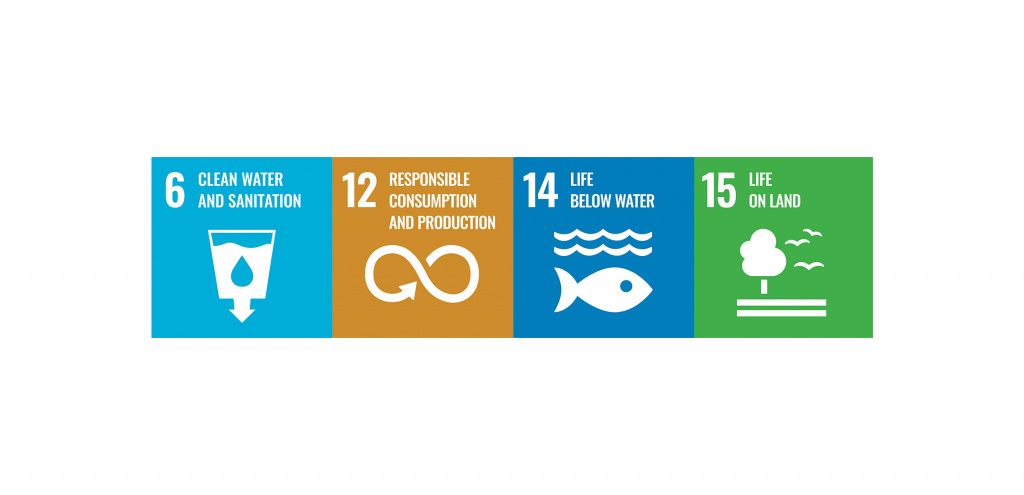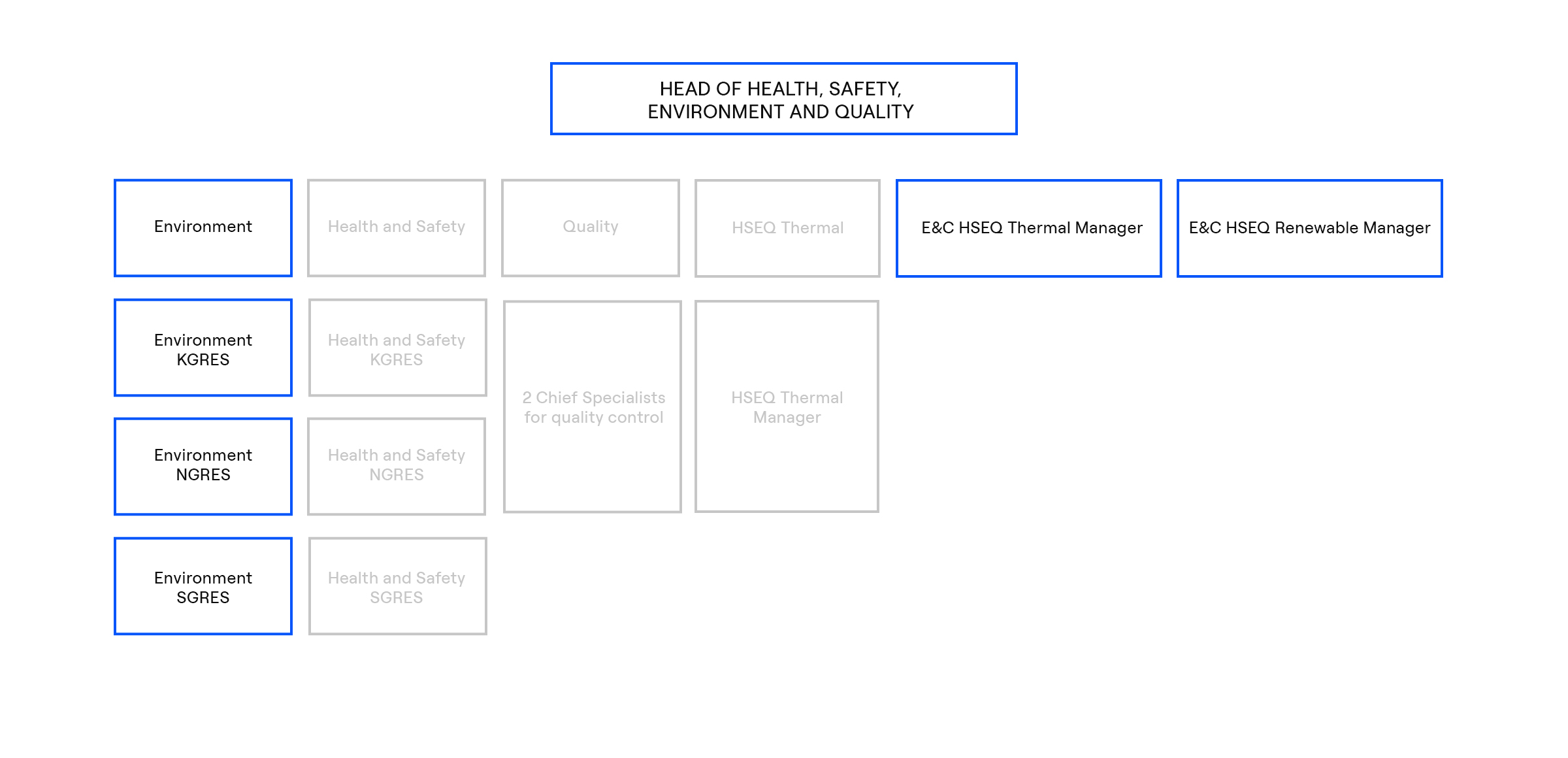Ecology
Our company is committed to preserving the environment, applying the rule of precaution and using the best available technology to improve efficiency of our power plants while also reducing our environmental footprint.
Our environmental initiatives help to ensure that local communities have an adequate standard of living and to contribute to achieving the UN Sustainable Development Goals:
We act according to the international ISO 14001 standard, for which all our power plants were certified.
Our work in the area of environmental safety encompasses a number of areas:
Pollutant emissions management
We strive to reduce emissions of pollutants into the atmospheric air, regularly check efficiency of our equipment and implement projects to upgrade it, introduce new technological solutions to reduce emissions of pollutants into the air, conduct regular air quality monitoring and control emissions of pollutants into the air to gradually reduce them. As a result of the company's phase-out from coal generation, total air pollutant emissions (including NOx, SOx, volatile organic compounds (VOCs), hazardous air pollutants, particulate matter, CO2) generated by the company decreased by 185 000 tons, or 92%.
In order to further reduce the company's impact on atmospheric air, we plan to continue implementing measures to upgrade existing equipment, which include a number of initiatives to reduce pollutant emissions, as well as projects to participate in thermal power plant generating equipment upgrade programs, allowing us to re-equip the most demanded generating facilities of the company by applying the best available technologies.
Water use management
Responsible use of water resources is one of our strategic objectives and involves an integrated approach based on three interrelated activities:
- Efficient use of water resources through timely elimination of defects in water consumption system equipment;
- Reducing water consumption through the secondary use of waste water;
- Identification and achievement of KPIs through the implementation of improvement measures.
In order to achieve the above objective, the company launched a project to optimize water consumption and wastewater disposal. The main performance indicator for the implementation of this project is the specific water intake for production needs and the share of reused water.
Waste management
The company takes a comprehensive approach to solving issues of effective waste management and strives to continuously reduce the negative impact of waste from power plants on the environment.
Our ability to transfer waste for disposal depends on the market of these services in the regions where the company's olants are located. In this regard, we regularly monitor the information contained in the data bank on waste and technologies for the disposal and neutralization of various types of waste, analyze the market of contractors specializing in waste disposal in the regions of our presence.
To ensure waste disposal, the company applies a KPI for waste disposal, which provides for an annual increase in the share of recycled waste out of the amount generated.
Protection of biodiversity
Biodiversity is of paramount importance to our company. We take into account possible risks and seek to protect and conserve biodiversity at all stages of our operations, including construction of new conventional and alternative generation facilities, modernization of existing facilities, heat and power generation activities, decommissioning and dismantling of generation facilities, through appropriate measures.
We are always open to dialogue and cooperation on biodiversity conservation and protection. We build dialogue with all stakeholders, including public authorities, local governments, public associations and non-profit organizations, scientific communities, as well as local communities and other organizations.
Our commitments in this area are enshrined in the Environmental Policy as well as the Biodiversity Policy. In 2021, we began practical implementation of the Biodiversity Policy. An important step in this direction was the development and disclosure of the Biodiversity Action Plan, which covers all key areas of work relevant to the company.
Information on the implementation of the "Action Plan for the Conservation and Protection of Biodiversity of PJSC EL5-Energo and its Significant Subsidiaries for 2021-2023" in 2021 available via link.
Environmental safety is managed by the Ecology Department of the Health and Safety, Environment and Quality (HSEQ) Directorate.
This directorate is entrusted to Dmitry Vavilov, Head of HSEQ. The environmental safety is managed by the Head of Environment:

Internal documents:
- Integrated policy for quality, health, safety, environment and energy efficiency
- Environmental policy
- Biodiversity policy
- Policy on rejection of single-use plastics
- Regulation on interaction with contractors in the field of HSEQ
- Regulation "Suppliers environmental assessment" (Internal)
- Regulation "Waste Management Guidelines" (internal)
- Integrated Health, Safety, Environment and Quality Management System Manual (internal)
National Documents:
- Federal Law dated 10.01.2002 N 7-FZ "On Environmental Protection"
- Federal Law N 96-FZ "On Atmospheric Air Protection" dated 04.05.1999
- "Water Code of the Russian Federation" dated 03.06.2006 N 74-FZ
- Federal Law dated 24.06.1998 N 89-FZ "On Production and Consumption Waste"
- Federal law dated 23.11.1995 N 174-FZ "On ecological expertise"
- Federal Law dated 30.03.1999 N 52-FZ "On the sanitary-epidemiological welfare of population"
- Federal Law dated 07.12.2011 N 416-FZ "On Water Supply and Sanitation"
- Russian Federation Law N 2395-1 dated 21.02.1992 "On Subsoil".
- Federal Law N 99-FZ from 04.05.2011 "On licensing certain types of activities
- Federal law of 24.04.1995 N 52-FZ "On Wildlife"
- Federal Law N 166-FZ from 20.12.2004 "On fisheries and the conservation of aquatic biological resources"
- GOST P ISO 14001-2016 National Standard of the Russian Federation. Environmental Management Systems Requirements and Guidance for Use
International documents:
- “Convention on Biological Diversity”(concluded in Rio de Janeiro 05.06.1992)
- "Vienna Convention for the Protection of the Ozone Layer" (concluded in Vienna on 22.03.1985)
- "Stockholm Convention on Persistent Organic Pollutants" (concluded in Stockholm on 22.05.2001)
- “The Convention on Environmental Impact Assessment in a Transboundary Context” (Concluded in Espoo on 25.02.1991))
- International Standard ISO 14001:2015 «Environmental Management Systems»

